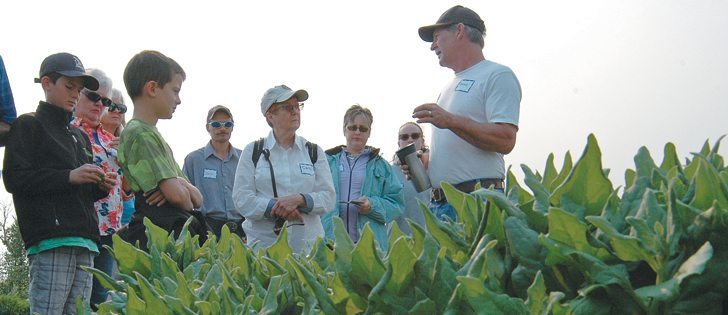Shane Woods pockets every vegetable seed he finds as he walks through his three-acre garden.
Mid-August is too soon to harvest seeds from most of the vegetables, but the work is so labour intensive that he takes every opportunity to reduce his workload.
Shane and Tami Woods own and operate the Wildrose Heritage Seed Co., which grows many kinds of vegetables strictly for seed. They have three gardens, but the most prominent is on leased land along Highway 3 on the east side of Lethbridge.
Shane estimates they are growing 400 varieties and species of plants this year, while Tami puts the estimate closer to 300.
Either way, the process of planting, watering, weeding, picking, drying, sorting and packaging is a gargantuan task.
Visitors to their operation, as part of an Aug. 20 tour organized by Organic Alberta, got a sense of its scope.
Shane has planted 78 types of tomatoes, 82 types of peppers and numerous varieties of squash, melons, potatoes, beets, carrots, corn, parsnips and spinach.
“You’d be surprised what can be grown in Lethbridge,” said Shane.
With no mechanization and no chemical use, weeds are the bane of his existence. Though not certified organic, the operation uses organic methods to grow and preserve heritage seed.
Read Also

Canola oil transloading facility opens
DP World just opened its new canola oil transload facility at the Port of Vancouver. It can ship one million tonnes of the commodity per year.
Shane is an offshore exploration geologist who has strong feelings about seed.
“We take the seed that you can grow over and over and over again. That’s what the whole idea of this company is, is to put it back in your hands, where it should be anyway,” he said.
“It shouldn’t be in conglomerates’ hands. Ninety-five percent of the seed in the world is owned by 10 companies. They’re all pharmaceutical companies. I’m not putting them down, but they dictate what we eat.”
It took him three years to find all the heritage varieties that he now plants, although Tami said his collection began much further back.
“It’s always been his passion. When we first got married 30 years ago, he was collecting seeds from all the different varieties already and saving them, and it’s just kind of grown from there.”
The business has been operating for three years and supplies seeds to In Case Of, an emergency preparedness company that supplies Costco and Wal-Mart. The seeds are also available locally.
The Woods said they would like to expand their operations and buy rather than lease land, but that will depend on this fall’s marketing efforts.
“We need to land a few big accounts and once we do that, if it goes like we plan, then we’ll be able to either go to BDC (the federal Business Development Bank) to get some money … and we’ve actually had a lot of people want to invest.”
Tami, a nurse, said until those deals are signed, she remains pleased that the business does not have debt.
Shane told the tour group about his concerns regarding waste. For example, he removes the tomato seeds and composts the fruit. It is the same with squash, peppers, pumpkins and most other produce from the garden.
This year, a group of women have agreed to remove the tomato seeds in exchange for the rest of the fruit, and he has found homes for some of the carrots and squash.
Still, the wasted food is a concern, even though it also makes rich compost. Food banks are limited in what they can accept if the vegetables have been cut open because of food safety risks.
“All you have to do is come by and pick it up,” he said about the seedless vegetables. “My wife and family and friends in Lethbridge can only take so much.”
Shane said he loves the business and its purpose, but the workload has been more than he bargained for. It’s time consuming, physically demanding and even dangerous, as he and Tami found when they dug parsnips.
Juice from the vegetables caused red, painful marks on their arms that lasted for days.
“Who would have thought that a parsnip would cause a burn on the skin like that?” he said as he pocketed a few more seeds.
“There are some inherent dangers involved in seed farming.”


















